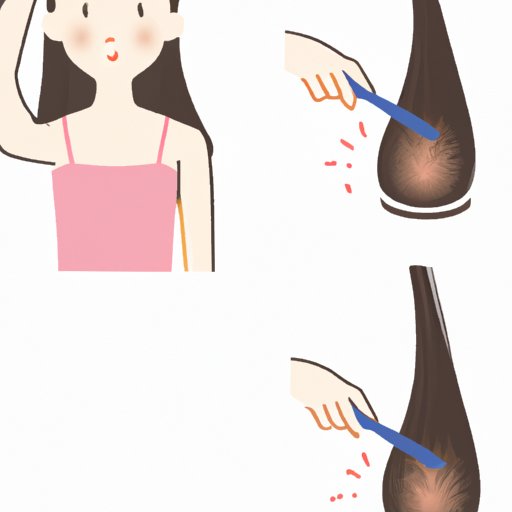Introduction
Thinning hair is a common problem for many women. It can range from mild shedding to more severe cases of hair loss, which can be distressing for any woman. But what are the causes of thinning hair in women? In this article, we’ll look at the various factors that can contribute to female hair loss and discuss strategies to help reduce its effects.
Impact of Hormonal Changes
Hormonal changes can have a significant impact on hair health. When hormones become imbalanced, this can lead to a disruption in the normal hair growth cycle, resulting in thinning hair. Common hormonal imbalances that can affect hair health include thyroid issues, menopause, pregnancy, and Polycystic Ovary Syndrome (PCOS). Each of these conditions can cause an increase in androgens, which can lead to hair loss.
Treating underlying hormonal imbalances may help reduce hair loss. For example, if a woman has a thyroid issue, her doctor may prescribe medications to correct the imbalance. If a woman is going through menopause, hormone replacement therapy may be recommended. And for those with PCOS, lifestyle modifications such as weight loss and increased exercise may help reduce androgen levels and improve overall hair health.
Stress and Hair Loss
Stress can also play a role in thinning hair. High levels of stress can lead to an increase in cortisol, a hormone that can disrupt the normal hair growth cycle. This can result in hair falling out more quickly than it can regrow, causing thinning hair. In addition, stress can cause other issues such as poor nutrition and lack of sleep, both of which can further contribute to hair loss.
Reducing stress can help improve hair health. Stress management techniques such as meditation, yoga, and deep breathing can be beneficial. Also, getting enough sleep and eating a nutritious diet can help reduce stress and promote healthy hair growth.
Diet and Hair Health
A balanced diet is essential for healthy hair growth. Certain nutrients are needed to keep hair strong and thick. These include protein, iron, zinc, and vitamins A, C, and B. Foods such as lean meats, fish, eggs, nuts, seeds, beans, leafy greens, and citrus fruits are all great sources of these nutrients.
In addition, limiting unhealthy foods such as processed foods, fried foods, and sugary drinks can help reduce inflammation and promote healthy hair growth. Drinking plenty of water is also important for keeping the scalp hydrated and preventing hair from becoming dry and brittle.
Genetics and Female Hair Loss
Genetics can also play a role in female hair loss. Women who have a family history of hair loss may be more likely to experience thinning hair. While there isn’t much you can do to change your genes, understanding the genetic connection to hair loss can help you be better prepared to manage it.
Factors such as age, stress levels, and nutrition can also increase the risk of genetic hair loss. So it’s important to take steps to reduce these factors, such as managing stress levels, eating a nutrient-rich diet, and avoiding harsh hair treatments.

Hair Products and Thin Hair
Hair products can also contribute to thinning hair. Some products contain harsh chemicals that can strip the hair of its natural oils and make it more prone to breakage. In addition, overstyling the hair with heated tools such as curling irons and blow dryers can cause damage and lead to thinning hair.
When choosing hair products, it’s important to select ones that are tailored to your hair type. Look for products that are free of sulfates, parabens, and other harsh chemicals. Also, try to limit the use of heated styling tools and let your hair air dry whenever possible.

Medical Conditions and Hair Loss
Certain medical conditions can also cause thinning hair. These include autoimmune disorders, skin conditions, and fungal infections. Treating the underlying condition can help improve hair health. For example, if a woman has an autoimmune disorder, her doctor may prescribe medications to help manage the condition.
It’s also important to talk to your doctor if you’re concerned about thinning hair. Your doctor may be able to recommend treatments or medications to help reduce hair loss.
Conclusion
Thinning hair in women can be caused by a variety of factors, including hormonal imbalances, stress, diet, genetics, and medical conditions. Taking steps to address these factors can help reduce hair loss and promote healthy hair growth. Eating a balanced diet, managing stress levels, and choosing the right hair products can all be beneficial. Additionally, treating underlying medical conditions may help improve hair health.
If you’re concerned about thinning hair, it’s important to talk to your doctor. They may be able to recommend treatments or medications to help improve hair health.


